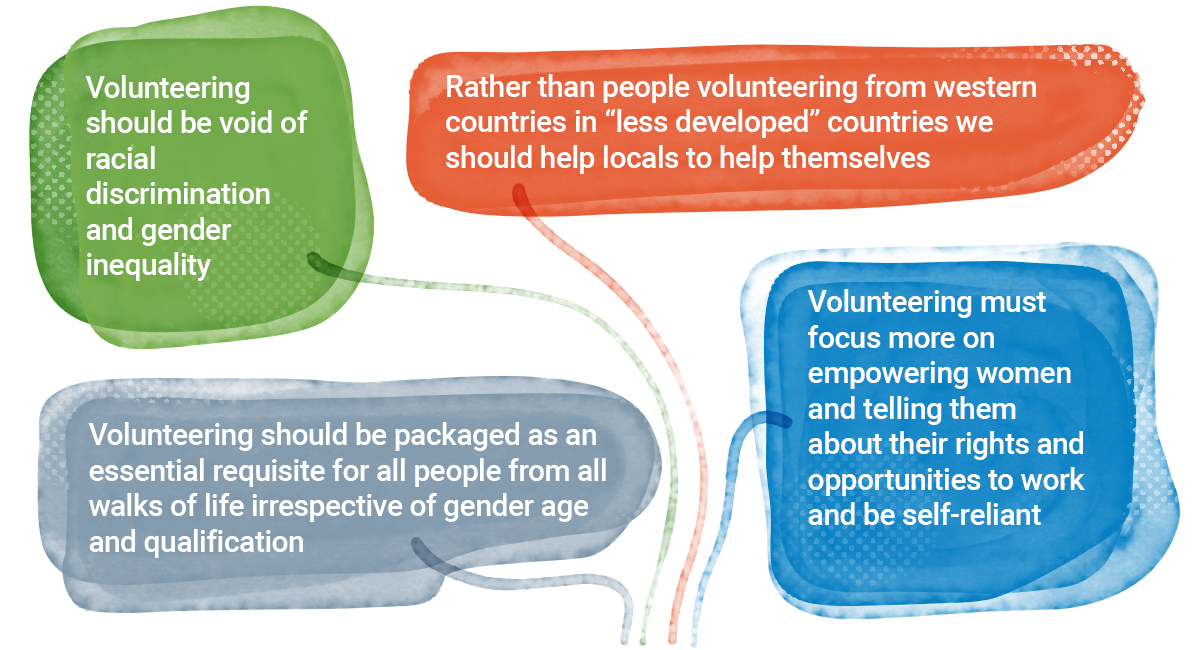Volunteering and the SDGs: what your voices tell us
Global Perceptions of Volunteering and its contributions to the Sustainable Development Goals
The Decade of Action is upon us. New resources, solutions and ambitions are urgently needed to put us back on track towards achieving the 2030 Agenda and its Sustainable Development Goals (SDGs).
Across the globe millions of people are already contributing to the SDGs, through their voluntary actions, however big or small.
These actions take different shapes and forms. We hear lots of examples on how volunteers helped reach the most marginalized, deliver essential services and tackle major development challenges. This is perhaps evident now more ever as in response to COVID-19 pandemic.
But we have yet to unlock the full value of volunteering for the SDGs. Part of this has to do with the lack of data and evidence on volunteering for the SDGs. To better understand what volunteering means for people, the Plan of Action secretariat listened to the voices of about 24,000 participants through a survey in early 2020.
Using the results of the survey, this data story looks at how people across the world perceive volunteering and its contributions towards the global goals.
Volunteering has a footprint across people’s lives
Volunteer action is everywhere. An overwhelming 90 per cent of the 24,000 respondents said that volunteers have helped someone that they know in their community or family. And nearly 30 per cent have been personally helped by volunteers.
Of the 23,700 survey respondents...
90% feel that volunteers helped someone in their communities
30% of the respondents...
have been personally helped by volunteers
For many people, volunteering is relevant to the SDGs
The survey revealed a very high level of appreciation of the relevance of volunteering to the SDGs: 99 per cent of survey respondents felt that volunteering was either essential or very important for the SDGs, with no differences in importance among volunteers and non-volunteers.
99% of the respondents...
felt that volunteering was either essential or very important for the SDGs.
Top 5 SDGs for which volunteers are most active
Participants felt that volunteers were most active on contributing to health issues (SDG3), education (SDG4), and hunger (SDG2).
Top 5 SDGs where volunteers are most active
While volunteering was strongly associated with delivering services, its contributions go far beyond
The contributions of volunteers are most associated with service delivery (55 per cent), followed by solving common problems (40 per cent), raising awareness (30 per cent) and campaigning for change (30 per cent).
Yet volunteering offers much more. Volunteering has distinctive characteristics such as mutual help, solidarity, self-organization and trust – all of which can be transformational for the SDGs.
In the context of leaving no one behind, many respondents expressed how volunteering can provide a powerful tool to reach the most marginalized groups.
55% of respondents...
Associate the contributions of volunteering with service delivery followed by solving common problems (40%) raising awareness (30%) and campaigning for change (30%).
Data and evidence can complete the picture
The survey helped build up a better view of public perceptions of volunteering and its importance. But to complete this picture, we need more data and evidence to back these perceptions. For example, in analysing the responses, we can see that there is considerable focus on “participation” and “service delivery” types of volunteering. However, we do not yet have clear evidence of how these impact the SDGs and people’s ownership.
What the respondents say...

Secondly, we need more evidence of the contributions of volunteering to specific SDGs beyond service delivery and individual actions. For example, many respondents mentioned that volunteering contributes to SDG 4 by building soft and hard skills. But going beyond that, we still lack robust evidence on the linkages between skills, development and employability, and a narrative of how volunteerism can help accelerate and transform SDG 4 (education) and SDG 8 (employment), especially in the context of work.
Let’s continue the discussions
Volunteering is more complex and diverse than people’s perceptions. While this survey confirms long-standing views and perceptions that volunteering is still highly relevant to today’s world, we have yet to unlock the transformative potential of volunteering, especially when it comes to addressing current development challenges.
Over the coming months, we will continue to gather views, experiences and ideas on how volunteering has contributed to the SDGs, together with different stakeholders. Share your views with us!
About
As of December 2020, about 24,000 individuals have responded to the survey. Most responses came from the Global South, with Nigeria, Kenya, Bangladesh, India and China as the most represented countries. Regarding gender, more men (58 per cent) than women (42 per cent) participated in the survey. Most respondents were between 16 and 45 years of age with at least secondary education. More than half of respondents had not volunteered themselves in the past four weeks.
